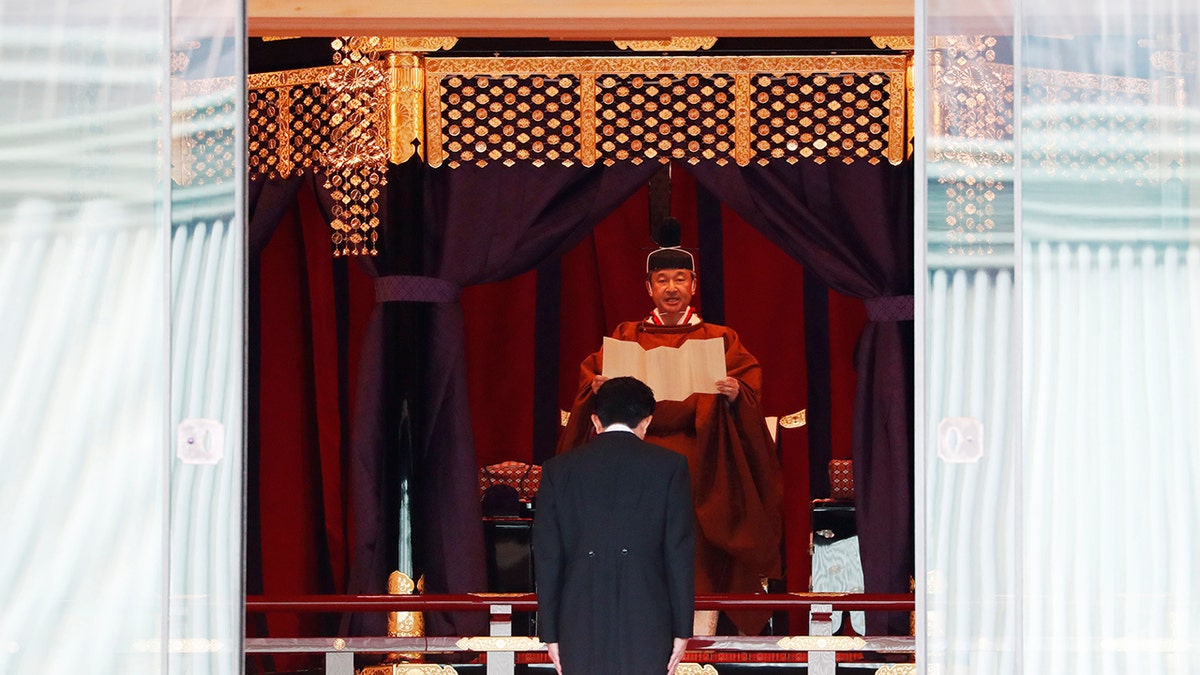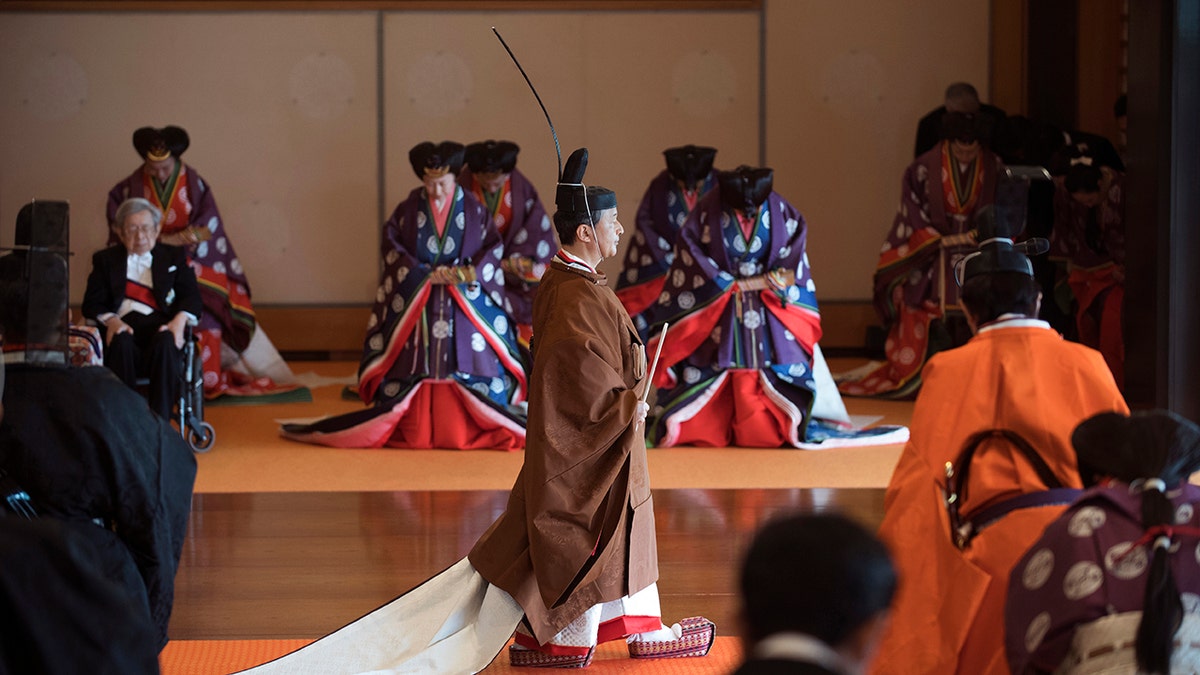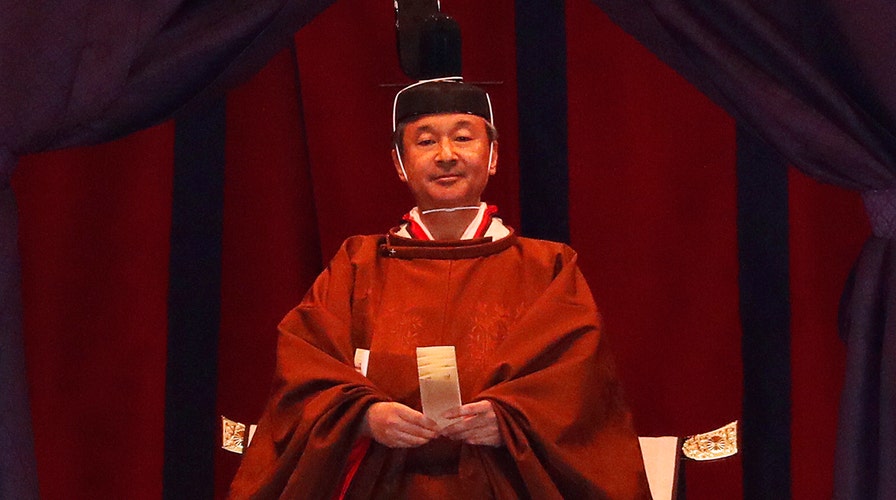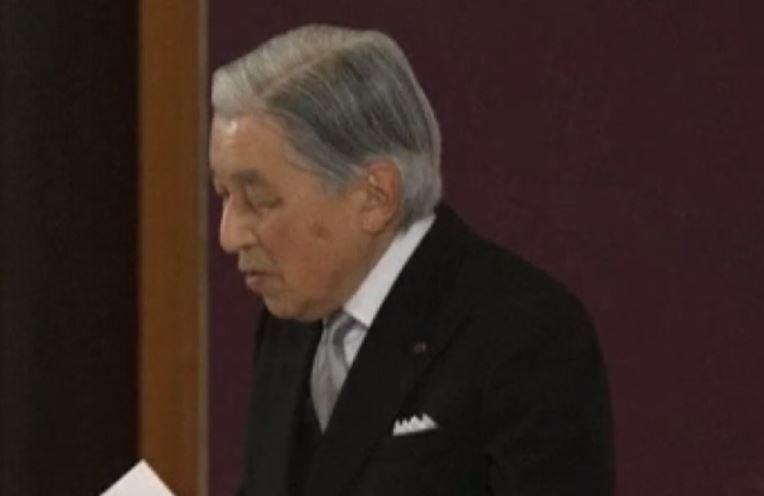Fox News Flash top headlines for Oct. 22
Fox News Flash top headlines for Oct. 22 are here. Check out what's clicking on Foxnews.com
More than half a million people were granted pardons in Japan on Tuesday as part of a pre-war custom of clemency to mark Naruhito formally ascending to the Chrysanthemum Throne as the nation’s 216th emperor.
The government of Prime Minister Shinzo Abe pardoned about 550,000 people who were found guilty of petty crimes such as traffic violations ahead of the ceremony to mark the occasion.
The emperor, 59, officially began his reign in May when he inherited the throne after the abdication of his father Akihito. However, Tuesday was when Naruhito pledged to serve as a symbol of the state for his people.
"I hereby proclaim my enthronement to those at home and abroad," Naruhito said. "I hereby swear that I will act according to the constitution and fulfill my responsibility as the symbol of the state and of the unity of the people of Japan, while always praying for the happiness of the people and the peace of the world as I stand with the people."

Japan's Emperor Naruhito attends a ceremony to proclaim his enthronement to the world, called Sokuirei-Seiden-no-gi, at the Imperial Palace in Tokyo, Japan, Tuesday, Oct. 22, 2019. (Issei Kato/Pool Photo via AP)
TYPHOON HAGIBIS SWEPT AWAY FUKUSHIMA NUCLEAR DECONTAMINATION WASTE BAGS INTO RIVER
Abe delivered a congratulatory address and led the cheers of “Banzai,” which traditionally means “10,000 years” or “long live the emperor.”
The short ceremony, who was attended by more than 180 international dignitaries including Prince Charles, began with the sound of a bell, while Naruhito - wearing a formal brownish-orange robe that was dyed in sappanwood and Japanese wax tree bark and a black headdress decorated with an upright tail – stood perfectly still while a pair of black-robed chamberlains pulled aside and secured the purple curtains surrounding the throne.

Japan's Emperor Naruhito speaks as Prime Minister Shinzo Abe bows during a ceremony to proclaim his enthronement to the world, called Sokuirei-Seiden-no-gi, at the Imperial Palace in Tokyo, Japan, Tuesday, Oct. 22, 2019. (Issei Kato/Pool Photo via AP)
The throne, called "Takamikura," is a 21-foot-high decorative structure resembling a gazebo. It was taken apart in 3,000 pieces and transported last year from the former Imperial Palace in Japan's ancient capital of Kyoto, where emperors lived until 150 years ago, and reassembled and repaired with new lacquer coatings.
Tuesday’s ceremony is the second of three ceremonies that followed the May succession. Next month sees the highly religious and divisive ritual of Daijosai, or the Great Thanksgiving.
While the harvest ritual is an annual event that the emperor performs privately, the government funds the first one by a new emperor as part of the succession ceremony. A one-off shrine for the Nov. 14-15 ritual is being constructed at the palace.
Some experts have raised questions over the government's funding of 16 billion yen ($150 million) for ceremonies that contain religious rites like Daijosai. Most of the cost goes to a one-time shrine that will be demolished after the event.

Japan's Emperor Naruhito, center, leaves at the end of the enthronement ceremony where he officially proclaimed his ascension to the Chrysanthemum Throne at the Imperial Palace in Tokyo, Tuesday, Oct. 22, 2019. (Kazuhiro Nogi/Pool Photo via AP)
FLASHBACK: JAPAN'S EMPEROR DECLARES ABDICATION IN HISTORIC CEREMONY IN TOKYO
Recent changes to the enthronement ceremonies included a slightly smaller structure for the empress, called "Michodai," or "The August Seat of the Empress," where Naruhito's wife, Masako, stood, dressed in traditional costume. It was first used by Naruhito's grandmother.
Naruhito and Masako, a Harvard-educated former diplomat, were to host a court banquet later Tuesday to be attended by about 400 foreign dignitaries and representatives from Japan's administrative, legislative and judicial branches and their spouses.

Japanese Empress Masako leaves the ceremony hall after Emperor Naruhito proclaimed his enthronement at the Imperial Palace in Tokyo, Tuesday, Oct. 22, 2019. (Kimimasa Mayama/Pool Photo via AP)
A parade originally planned for Tuesday afternoon had been postponed until Nov. 10 because of the recent Typhoon Hagibis that caused flooding and other damage in central and northern Japan.
“Today is an important day for the new emperor and the empress,” 78-year-old Shuichi Hachinuma, who traveled to Tokyo, told AFP. “I feel the emperor is closer to us, compared to in the past. … I want him to send a message of peace.”
CLICK HERE TO GET THE FOX NEWS APP
Naruhito, who studied at Oxford, leads the world's oldest hereditary monarchy, which historians say goes back 1,500 years.
He is a historian, a viola player and an expert on water transport. Masako has struggled for more than a decade since developing "adjustment disorder" after giving birth to the couple's only child, Princess Aiko, and facing pressure to produce a boy in Japan's monarchy, which allows only male heirs.
A shortage of males in the royal family has raised succession concerns and prompted calls for a debate, possibly to allow female emperors. Naruhito has an 83-year-old uncle and two potential heirs — his younger brother Crown Prince Akishino and a 13-year-old nephew.
Abe and his ultra-conservative supporters insist on male-only succession, while a majority of the general public supports allowing female emperors.
The Associated Press contributed to this report.










































